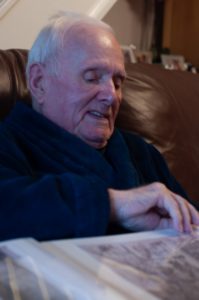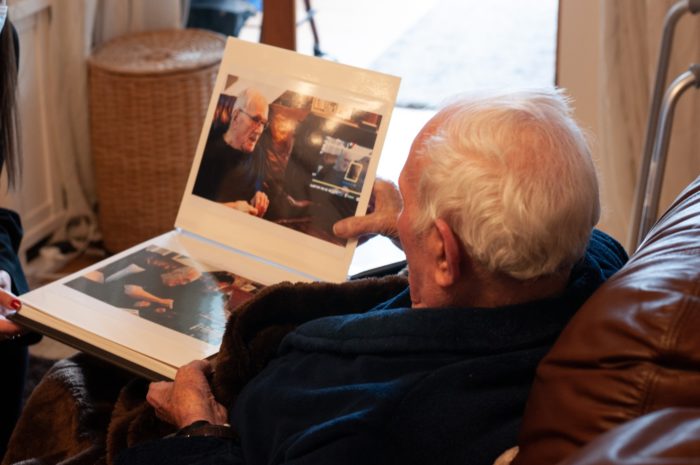Dennis is 101, a father, grandfather, great grandfather, great great grandfather and one of only two remaining surviving prisoners of the Lisbon Maru. Here, Dennis shares his experience of his time on the Lisbon Maru and surviving three years and eight months in Japanese captivity.

“I grew up in London and then left home to join the Royal Scots when I was 16. In 1942, I was taken captive and put on board the Lisbon Maru to make our journey from Hong Kong to Japan. From what I can remember, the initial part of that journey wasn’t too bad, but the conditions of the ship were terrible. We were kept down at the bottom in the hold of the ship; it was like a reservoir of sewage. But we got used to it, we had to.
“There were over 1,000 British prisoners of war onboard the Lisbon Maru. Our journey took us up the coast of China, staying quite close because there were US submarines stationed nearby sinking all the ships that went, and we got hit. We shouldn’t have been – our ship should have been bearing a flag that said there were prisoners of war onboard which would have protected us – but there wasn’t.
“When the ship went down, 828 prisoners drowned. I managed to climb onto the bows of the ship, and somebody else and I were sitting up there just talking away – we couldn’t care less at that point. Eventually we got into the sea and just floated. When I was a kid, there was this old boy who was always hanging on his gates. He used to tell us about his wartime experience, and he had said to us, “you’ve got to learn to float”. So that’s what I did. No panic. I knew I was going to live, and that was it. It was a beautiful day. The sea was calm. There were no waves. That was it. I survived – because I’m a survivor.
“Lots of prisoners were jumping off the ship as it was sinking, and they were being fired at by our captors. They stopped when some Chinese fishermen approached and started to rescue us; but I got picked up by another Japanese ship. When I got on board, this chap offered me a cup of green tea and a cigarette – and that was a life saver.
“Then, we were taken to the north east coast of Japan and put on the docks until the end of the war. My mate and I had heard on the radio that the war had finished in Europe, so we knew that the Japanese couldn’t hold onto us much longer. And then one day, an American soldier walked into our camp and said: “You’re free. The war’s over”. And that was it.
“We were given these Japanese uniforms to wear on our journey home, but we were just skin and bones, so they didn’t fit. In Hamamatsu, we were taken onboard an American Army Personal Hospital ship, and when we were climbing up the ladder, we just took off our clothes one by one and threw them into the water. By the time we got to the top we had nothing on, and it was perfect. They sprayed us with this disinfectant and gave us an American naval uniform, and we were on our way home.
“When I returned home, one of my mates that I was a prisoner of war with asked me to go and live with him in Bristol, so I got settled down there for a bit.
“I later met the love of my life, and she really was. Sadly, she died at the age of 30, when our daughter Denise was three years old. When she went, it was as though somebody had kicked me in the stomach.
“But here I am. I’m alive, I survived. There were 828 other soldiers in different regiments that died when the ship sank, so I’m very lucky.”

Helping Hands
Dennis has been receiving care from Helping Hands since 2 July. He has lived with his daughter Denise for over 17 years, who was his main carer until Helping Hands came on board.
Denise says: “I retired around four years ago after I hurt my back lifting Dad’s wheelchair into the car, and then about two years after that he had a stroke and his health deteriorated.
“Earlier this year, Dad went into hospital, but they wouldn’t let him home until we had a proper care plan in place. So, on 2 July, he came home and at 7.30pm the very same day, our first carer came. I’m very grateful for the help. I was struggling to cope and was really desperate. I had no help. But now, here you are, and it’s a great relief for me.”
